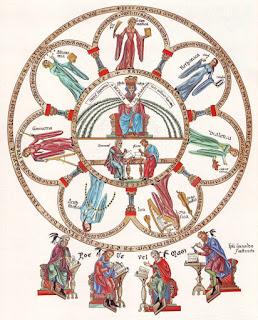Commonplace Essays with Writing & Rhetoric
It bears repeating. The Writing & Rhetoric series by Classical Academic Press is really amazing. My 5th and 6th graders are in Ch. 5 of the sixth book. They are learning to write commonplace essays, which are six paragraph essays refuting bad character traits. They wrote their first essay this week. We were behind schedule, and weren't going to finish for class. I was fine with that and wasn't rushing them, but they both wanted to finish their essays for class so badly they stayed up late Thursday night in order to finish it. This is their first attempt at a commonplace essay. I was SO pleased with the results. They had minimal help with these! :) (These were typed as they were written. Any mistakes are not typos, but the kids' grammar and spelling errors.) :)
Against Boasters
by Kiryn Preedy (10 years old)
Boasters cover up weakness by puffing up their deeds and can cause real harm. When boasters exaggerate things they have done, they don’t know some people can see through them, proving the boaster untrustworthy. A boaster will also take credit for something their friend has done, hurting the other person. Humility shows trustworthiness, while boasters can’t be trusted with anything.
We can see how awful a boaster is by comparing him to a humble, modest person. Take George Washington for example. He was one of the most humble people American has seen. He was made Commander-in-cheif of the U.S. army during the War of Independence. He felt “it was a trust to great for [his] capacity.” Later, after the war ended, George Washington became the first president of the United States. Yet, he never did any of it out of his own ambition. Washington never submitted to his desire to lead a quiet life on Mt. Vernon, but faithfully served his country for many years. A boaster would seek fame and glory for doing as little as possible.
When a boaster is feeling down, here is something he might say to himself. “I didn’t fail that, they were just bad judges. I always do everything perfectly the first time without even trying. I did that performance much better than the other kid. I bet the judges favored him and that’s why he won. Yeah, I did things no one else can.” This kind of thinking could lead to broken relationships, hurt feelings, and all kinds of stuff like that.
Boasters and gossipers can both hurt people with words. Gossipers are people who spread rumors about a person that they heard from someone else. Spreading rumors about someone can hurt that person and break a relationship. Then that person could take revenge and start spreading rumors about them. As bad as this is, boasting hurts even more, it breaks relationships, hurts feelings, causes gossip, and can even lead to physical harm.
When a boaster gets hurt from his own doing, you shouldn’t pity him. he got what was coming to him, and although his friends may pity him, we still shouldn’t. Think of all the people he could hurt with his words. Take General Braddock for example. He was so boastful “that nearly all of Washington’s troops were killed, and a great many English as well,” during the battle of Monongahela.
Ask yourself, what effect does boasting have on others? What might be dangerous about a boaster? Take this, General Braddock received a mortal wound during the battle of Monongahela because he was to prideful to listen to Washington. So saying, this is my commonplace essay against boasters.
Against Boasters
by Luke Preedy (12 years old)
Boasters not only are unpleasant to be around, but can also be dangerous. They can be unpleasant to be around because they blab on and on about themselves and never give anybody else credit. They are dangerous because their words provoke other people which can lead to physical quarrels. Humility leads to friendship, whereas boasting leads to loneliness.
George Washington was commander-in Chief of the American army. He was the First President of the United States of America. Even though he made many accomplishments in his life he never took them for granted and continued to be humble throughout the rest of his life. He never intended to be President or Commander-in-Chief. While Washington deserves a lot of credit for the deeds he did he never looked for any attention. Whereas a boaster is constantly looking for attention and credit for things they didn’t do.
A boaster wants to put himself higher than anybody else. This is what a boaster will think: “I am awesome. I deserve all the credit for my totally successful deeds. I can do things nobody else can do.” Always avoid boasters because you can’t trust them.
There are other types of wrongdoers, take for example, a critical person. Critical people correct everybody on everything, they are always finding fault tin other people, but no in themselves. It makes people feel hurt, and to not want to be around them. Both boasters and critical people make people have hurt feelings, but boasters are worse because their words can lead to harm not just to other people but to themselves as well.
You shouldn’t have pity for a boaster. Take General Braddock for example. He went into a forest filled with Indians he didn’t know anything about. his consequence ended up being the death of his army and himself. Not only did he get in trouble, but he led General Washington into it. He nearly killed Washington, and he killed Washington’s whole army.
Finnaly, I appeal to justice. For example, the story of Falstaff and Prince Harry. Harry played a trick on Falstaff to see his true character. When Falstaff got to Harry, he exaggerated the whole story. And Prince Harry saw Falstaff’s character was boastful. Prince Harry caught his friend lying and found out he was untrustworthy. This proves that all boasters are untrustworthy.


Comments
Post a Comment